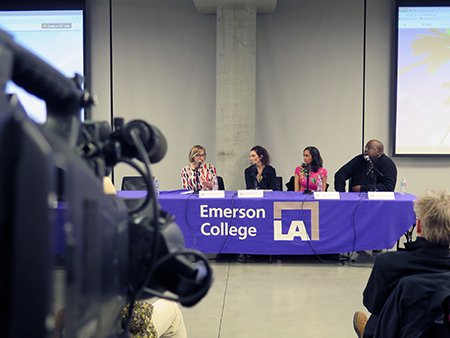Oscar Talk at ELA Spotlights Diversity
Everyone’s talking about the huge gaffe that happened at the end of the 89th Academy Awards ceremony on February 26 during the best picture presentation, but during two days of panels at Emerson College Los Angeles, talk focused on promoting diversity in the entertainment industry, creating Oscar buzz, the business of movies, and the impact of the awards from a European perspective.
Oscar Talk LA, a series of panels produced by Owen Eagen, executive-in-residence in Emerson’s Department of Communication Studies, kicked off on February 23 with panelists discussing diversity in the entertainment industry. Panelists included Miranda Banks, associate professor in Visual and Media Arts and principal investigator at the Emerson Engagement Lab; Madeline Di Nonno, chief executive officer of the Geena Davis Institute on Gender in Media; Rasha Goel, Emmy-nominated TV host/producer, entertainment reporter, and entrepreneur; and Gil L. Robertson IV, co-founder and president of the African American Film Critics Association. Raul Reis, dean of Emerson’s School of Communication, moderated the panel.

After the #OscarsSoWhite controversies of the 87th and 88th Academy Awards ceremonies, this year’s telecast featured more racial diversity among the nominees in the major categories with Mahershala Ali and Viola Davis winning acting Oscars and Moonlight taking the best picture honors.
“2016 really represented an amazing tapestry of films of the African American experience,” said Robertson. “Hopefully it’s not a once in a lifetime, but I don’t know if I can call it a trend.”
Di Nonno said diversity in the industry extends to women in film. She pointed to one 2015 study from the Geena Davis Institute that showed male characters spoke two times as often as female characters in the top box office movies despite the fact that on average, of the top 100 grossing non-animated films that year, ones led by women grossed 15.8 percent more.
“It’s a myth that men won’t watch women [leading in films]. It keeps perpetuating,” said Di Nonno. “[We need to] use data to get films properly positioned.”
Goel, who has spent more than 15 years in the entertainment industry, said that as studios become more dependent on foreign countries to generate revenue, the industry would have to adapt and respond.
“You have the same type of people running the market thinking it’s the same type of formula that works,” said Goel. “People want to see themselves represented. These foreign markets want to see their actors being celebrated.”

Banks, a visiting faculty member at ELA this semester, said that Hollywood has looked for strategies to increase diversity since the ’60s, but that it’s become newsworthy again in recent years. She said that it’s important to look at the industry and understand why people pursue careers in certain subfields, like producing for women and cinematography for men. One way to make substantive change is through education.
“The problem isn’t just with the industry. The problem is also with us [in education],” said Banks, who pointed out implicit bias and the gendering of labor as reasons why some fields lack diversity. “Who do [students] choose to collaborate with and why?”
Banks’s observations struck a chord with ELA student Caroline Sullivan ’17.
“It was interesting what Professor Banks was saying about how diversity comes in waves and how important it is that we make sure it’s not just a trendy issue,” said Sullivan. “We need to make sure it’s a progressive issue that people keep striving toward and not just a fad that fades away in a year or two.”

Audience members at the Diversity in the
Alumna Joyce Clarke ’76 attended the panel wanting reassurance that things were going to change.
“I was hoping that industry insiders like this panel would show me that they really are genuinely concerned and putting things in motion to keep diversity in the forefront,” said Clarke. “And I got that.”
Raul Reis, the School of Communication dean, said that the panelists brought to light many issues and problems in the industry.
“It’s up to the new generation that’s studying at Emerson and other schools to enact change,” he said.
Categories